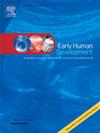识别早产学龄儿童的认知脆弱性:新生儿和早期生活因素的作用
IF 2
3区 医学
Q2 OBSTETRICS & GYNECOLOGY
引用次数: 0
摘要
早产儿童出现认知障碍的风险增加。虽然胎龄是一个已知的预测因素,但早期生活变量(如母乳喂养、新生儿重症监护室住院时间和出生体重)对后期认知结果的综合影响尚不清楚。目的比较早产儿和非早产儿学龄儿童的认知表现,探讨言语和非言语智力的新生儿和产后预测因素。方法采用Raven's彩色递进矩阵(CPM)和Crichton词汇量表(CVS)对140例6-12岁儿童(早产儿70例,非早产儿70例)进行评估。使用Mann-Whitney U检验和多元线性回归来检验组间差异和认知得分的预测因子。预测因素包括胎龄、新生儿重症监护室住院时间、社会经济地位(SES)、母乳喂养、出生体重、年龄和性别。VIF值用于评估多重共线性。结果早产儿的CPM (p < 0.001, r = - 0.27)和CVS (p < 0.001, r = - 0.43)得分均显著低于非早产儿。回归模型显示胎龄是两个尺度上一致的预测因子。母乳喂养和较高的SES与较高的CPM和CVS评分相关,而延长新生儿重症监护病房的时间会对CVS表现产生负面影响。未检测到多重共线性问题(VIF < 2.6)。结论早产与儿童中期认知能力下降有关,尤其是言语推理能力下降。母乳喂养和较短的新生儿重症监护病房可能提供保护作用。这些发现强调了早期生活因素的重要性,并支持对早产儿群体进行有针对性的发育监测和干预。本文章由计算机程序翻译,如有差异,请以英文原文为准。
Identifying cognitive vulnerability in school-aged children born preterm: The role of neonatal and early-life factors
Background
Children born preterm are at increased risk for cognitive difficulties. While gestational age is a known predictor, the combined influence of early-life variables such as breastfeeding, NICU stay, and birth weight on later cognitive outcomes remains less understood.
Objective
To compare cognitive performance between preterm and non preterm school-aged children and identify neonatal and postnatal predictors of verbal and non verbal intelligence.
Methods
A total of 140 children aged 6–12 years (70 preterm, 70 non preterm) were assessed using Raven's Coloured Progressive Matrices (CPM) and Crichton Vocabulary Scale (CVS). Mann–Whitney U tests and multiple linear regressions were used to examine group differences and predictors of cognitive scores. Predictors included gestational age, NICU stay, socioeconomic status (SES), breastfeeding, birth weight, age, and sex. VIF values were used to assess multicollinearity.
Results
Preterm children scored significantly lower than non preterm peers on both CPM (p < 0.001, r = − 0.27) and CVS (p < 0.001, r = − 0.43). Regression models showed that gestational age was a consistent predictor across both scales. Breastfeeding and higher SES were associated with higher CPM and CVS scores, while prolonged NICU stay negatively impacted CVS performance. No multicollinearity issues were detected (VIF < 2.6).
Conclusion
Preterm birth is linked to reduced cognitive performance during middle childhood, especially in verbal reasoning. Breastfeeding and shorter NICU stay may offer protective benefits. These findings highlight the importance of early-life factors and support targeted developmental surveillance and interventions for preterm populations.
求助全文
通过发布文献求助,成功后即可免费获取论文全文。
去求助
来源期刊

Early human development
医学-妇产科学
CiteScore
4.40
自引率
4.00%
发文量
100
审稿时长
46 days
期刊介绍:
Established as an authoritative, highly cited voice on early human development, Early Human Development provides a unique opportunity for researchers and clinicians to bridge the communication gap between disciplines. Creating a forum for the productive exchange of ideas concerning early human growth and development, the journal publishes original research and clinical papers with particular emphasis on the continuum between fetal life and the perinatal period; aspects of postnatal growth influenced by early events; and the safeguarding of the quality of human survival.
The first comprehensive and interdisciplinary journal in this area of growing importance, Early Human Development offers pertinent contributions to the following subject areas:
Fetology; perinatology; pediatrics; growth and development; obstetrics; reproduction and fertility; epidemiology; behavioural sciences; nutrition and metabolism; teratology; neurology; brain biology; developmental psychology and screening.
 求助内容:
求助内容: 应助结果提醒方式:
应助结果提醒方式:


